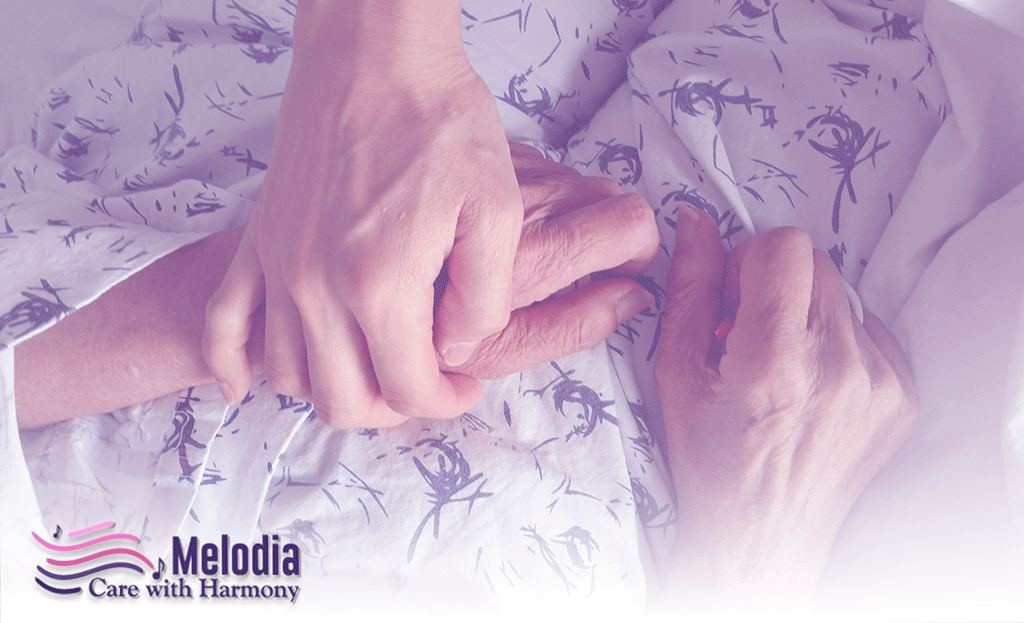At Melodia Care Hospice, our dedicated staff strives to enhance our patients’ physical and emotional well-being, improving their quality of life. We support patients and their families in understanding and navigating terminal illnesses, ensuring compassionate care throughout this difficult journey.
Hospice care can significantly impact a person’s behavior, dietary habits, emotions, and daily life. It’s normal to experience changes such as loss of appetite, increased sleep, or restlessness. While each person’s final stages can vary, the following timeline provides a general idea of what to expect and reassures you that we are here to help during this challenging time.
The end of life timeline stages

As your loved one approaches the end of life, they will likely go through several stages, each marked by distinct physical and emotional changes. Understanding these stages can help caregivers provide appropriate support and compassionate care.
One to Three Months Before Death
In the initial phase, patients often experience increased fatigue and a noticeable decrease in appetite. Their risk of infection may rise, accompanied by worsening pain and nausea. Behavioral changes are common, with some individuals becoming more introverted and quieter, while others might become introspective or engage in more activity as they process their thoughts and feelings.
One to Two Weeks Before Death
Patients typically become drowsier and may stop eating as the end draws nearer. Increased confusion and disorientation are common, with many experiencing heightened fear and anxiety. During this time, patients might have visions of deceased loved ones, and significant changes in vital signs such as temperature, respiration, pulse, and blood pressure occur. They may also struggle to take oral medications or remain hydrated, often being too exhausted to get out of bed.
Last Few Days or Hours
In the final days or hours, patients might experience a brief surge of energy before their condition rapidly declines. Blood pressure continues to drop, breathing patterns become irregular, and their hands and feet may become cold and discolored. The pulse weakens, eyes may become moist or clouded, and urine output decreases. These signs, including the distinctive “death rattle” and skin changes, indicate that the end is near.
Moments Before Death
In the last moments, you may notice that your loved one opens their eyes and mouth and experiences difficulty breathing. They may not respond to your presence. Creating a calm and comfortable environment is essential, allowing them to rest peacefully, often alternating between sleep, wakefulness, and dreaming.
How will you handle death?

Handling the death of a loved one is incredibly challenging. It’s important to take the time to confirm the death with a professional and discuss and honor your loved one’s final wishes, including music, religious rites, and personal items. Saying your farewells and arranging for a meaningful ceremony can be a crucial part of the grieving process. After reviewing this timeline, reach out to your doctor or the Melodia Care team for support. Our routine medical care helps patients and families prepare for death and manage their grief.
Clinical dying signs and death

Clinical indicators often align with the approach of death. A combination of signs increases the likelihood of death, with more symptoms typically indicating a higher risk of imminent passing. The active dying stage generally lasts about three days, while the pre-active stage lasts approximately three weeks. Common symptoms include unresponsiveness and a significant drop in blood pressure.
Emotional Signs of Approaching Death
Besides physical symptoms, emotional indicators can also signal the end of life. Patients may experience prolonged fatigue, sleepiness, unconsciousness, confusion, and disorientation, often seeing or hearing things that are not present. Social withdrawal and a desire to review their life or resolve unfinished matters are common, as is planning for their funeral.
Hospice Team Involvement During the Dying Stages

The hospice interdisciplinary team updates care plans and provides comprehensive support, including modifying visit schedules, educating about death, adjusting medications, and ensuring necessary medical equipment. Nurses, nurse practitioners, and doctors discuss discontinuing non-beneficial treatments, provide medications and equipment for symptom management, and educate family members on pain relief and physiological changes.
Social workers and chaplains assist with emotional and relational support, facilitate life review and meaning-making, and help with forgiveness, farewells, and acceptance. Hospice aides recognize clinical signs of impending death and support the patient and family through the process.
End of life care

Hospice care allows you to accompany your loved one on their final journey. Ensure their comfort by engaging in enjoyable activities together, keeping them hydrated and fed without forcing intake, and assisting with movement to prevent bedsores. Stay connected with your loved one, by encouraging activities that provide comfort and understanding. Medical staff should communicate effectively, even with non-verbal patients.
Encourage a good way of dealing with loss

Remind family members and caregivers that grieving is a personal process that evolves over time. Medicare-certified hospices offer grief counseling for up to a year after the patient’s death. Encourage relatives and friends to support each other through the grieving process, fostering a community of care and understanding.
Conclusion
Navigating the final stages of life is an immensely challenging experience for both patients and their loved ones. At Melodia Care Hospice, our commitment is to provide compassionate, comprehensive support during this journey. Understanding the stages of dying can help caregivers prepare and offer the appropriate care and comfort needed at each stage. While the signs and symptoms may vary, our dedication to ensuring dignity, peace, and comfort for our patients remains the same.
The end-of-life process is not just a medical journey but an emotional and spiritual one as well. Our interdisciplinary team is here to guide you through these stages, offering support, education, and solace. Remember, you are not alone; we are here to walk this path with you, ensuring that your loved one’s final days are filled with care and compassion.
As you cope with the impending loss, it is essential to cherish the moments you have together, provide comfort, and seek the support you need. Grieving is a deeply personal process, and our team is available to help you through each step, offering grief counseling and support for as long as you need.
At Melodia Care Hospice, our goal is to make the end-of-life experience as peaceful and meaningful as possible, providing the highest standard of care and support to both our patients and their families.
FAQS
What are the stages of dying in hospice care?
The stages typically include:
One to Three Months Before Death: Increased fatigue, decreased appetite, and behavioral changes.
One to Two Weeks Before Death: Drowsiness, confusion, changes in vital signs, withdrawal.
Last Few Days or Hours: Irregular breathing, cold extremities, weakened pulse.
Moments Before Death: Labored breathing, unresponsiveness, brief moments of wakefulness.
It’s essential to understand that reduced appetite and weight loss are not signs of suffering; rather, they occur as the body prepares for death by slowing down its metabolism and requiring less food.
How do emotional and behavioral changes manifest as a person nears death?
Patients may exhibit prolonged fatigue, confusion, disorientation, and social withdrawal. They might also have visions, feel a need to review their life, resolve unfinished matters, and plan for their funeral.
Social and cultural factors can also play a role in shaping a person’s experience. For instance:
Gender roles can influence how openly someone talks about their mortality and end-of-life wishes.
Religious and cultural backgrounds may impact practices, rituals, and customs related to the end-of-life timeline.
As individuals accept their mortality and realize death is approaching, they may start to withdraw and reflect.
What are the three general stages of dying?
The stages of dying are determined based on early, middle, and last-stage symptoms. These stages involve changes in responsiveness and body function. Factors such as illness, medication, and physical makeup influence the individual experience.
Is the dying process the same for everyone?
No, each person’s experience may vary, and not everyone follows the same timeline. Some individuals may progress through the stages more rapidly or slowly than others. It’s essential to provide personalized care and support based on the unique needs of each patient.
What role does the interdisciplinary hospice team play?
The team includes doctors, nurses, social workers, chaplains, and aides who provide medical care, emotional support, and help with practical needs. They update care plans, manage symptoms, educate families, and offer bereavement support.
What support does Melodia Care Hospice offer after a patient’s death?
Melodia Care Hospice provides grief counseling for up to a year after the patient’s death. Our team supports families through the grieving process, helping them find closure and cope with their loss.
How can hospice care improve the quality of life for terminally ill patients?
Hospice care provided by Melodia focuses on pain and symptom management, emotional and spiritual support, and ensuring patients are comfortable. It helps patients live their remaining days with dignity and as much comfort as possible.








